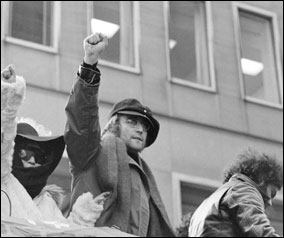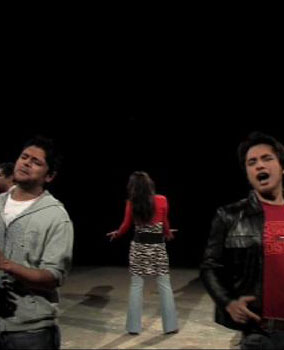|
|
| |
comment
Giving peace a chance
'Yeh Hum Naheen' is the latest addition to life affirming music
anthems
By
Sonya Rehman |
| |
| At
street demons-trations and marches, songs ('Oh freedom', 'This little
light of mine', 'We shall not be moved') were an extremely fundamental
part of the American Civil Rights Movement. Lyrics such as "All
the state troopers, we shall not be moved/ Just like a tree that's
standing by the water/ We shall not be moved" - spoke of the
fervent spirit at a time when racial bigotry was at its bloodiest
zenith. |
| |
| And
then at the height of the Vietnam War, John Lennon's 'Give Peace a
Chance' kick-started a nationwide anti-war faction. The song had become
an 'anthem' of the movement against the war, so much so that in 1969,
on the second Vietnam Moratorium Day, half a million protestors sung
along to the chorus of: "all we are saying...is give peace a
chance". From his ex-Beatle days, make-love-not-war-poster-child
Lennon focused much of his solo career not only as an artiste but
also as an inexorable social activist at the risk of being deported
from his homeland. These are just a few of the many examples that
illustrate the power that music brings with it - be it with regard
to social revolutions and/or the alteration of a vast majority of
peoples to 'get thinking' a certain way. |
 |
| |
In
the West, a celebrity's opinion is considered just as significant
(if not more) as a politician's. This has led countless Western artistes
to produce songs on globalization ('Dogs' by Pink Floyd), on the environment
('Heal the World' by Michael Jackson), on imperialism ('Sleep Now
in the Fire' by Rage against the machine), on child abuse ('Janie's
Got a Gun' by Aerosmith) and on nuclear weapons ('A Hard Rain's a
Gonna Fall' by Bob Dylan) to name a few.
And it's catching on in Pakistan too. Our musicians aren't all that
far behind either. 'People are People' by Aamir Zaki, Junoon's 'No
More', 'Beirut' by Strings and Salman Ahmad's 'Al-vida' are some of
the scores of songs - with spines of social annotations - produced
by Pakistani artistes (which impel local audiences to ripen the conscience
with 'awareness'), that set free the dusty padlocks of dogmatic, unyielding
thought.
As of late, an EMI released song called 'Yeh Hum Naheen' (produced
by Shuja Haider with lyrics by Ali Moeen) has been doing the loop
on local music channels. At a press conference that was held on February
17, 2007, it was stated that Pakistani artistes (namely Strings, Shafqat
Amanat Ali, Haroon, Hadiqa Kiyani, Ali Zafar and Ali Haider) collaborated
on a song that bases its idea against terrorism in light of the current
- war on terrorism - affairs. As stated in its press release, "the
song and accompanying video are the brainchild of Waseem Mahmood,
author and media consultant who specializes in the reconstruction
of media in post war countries".
Speaking with Instep, Waseem declared that Pakistan was not a terrorist
state and that "Islam is a religion that bases its foundation
on peace and tolerance". He went on to state the fact that his
children had acted as the main mechanisms that propelled him to come
up with the concept for 'Yeh Hum Naheen'. "We can only change
the perception of others when we know what defines our identity. The
youth of Pakistan will respond to either musicians or cricketers.
This is why I went for a song and video that featured local musicians.
And it truly was incredible to see some of the biggest stars of the
country come together on a single platform without any fuss or hassle",
Waseem had gone on to say. Legendary boxing champ, Mohammed Ali, was
also said to have sent a message of appreciation and encouragement
to the group on their efforts in aiding to rebuild the Muslim world's
broken image. So inspired by the support was Waseem that he instantly
set up a 'Yeh Hum Naheen Charitable Foundation' for future projects
that are to deal with similar issues regarding the unmerited juxtaposition
of Muslims and terrorism. |
| |
Imagine
a world without freedom of speech via music - how different would
our history be? And just think, how different would our present be?
What would have changed, what would have remained? Would we be powerless?
Desensitized and numbed if musical expression (bespeaking of truth)
were to be clamped down upon? What significance would the word 'free'
then hold? None. None whatsoever. It'd be as empty and as nasty as
a four-letter, casually tossed about 'f' word.
In light of the current circumstances, songs such as 'Yeh Hum Naheen'
are needed now more than ever before. While some of you may be gnawed
by pessimism and nibbled by cynicism, allow me to say, that if change
(even if it's microscopic) can be brought about by a song resulting
in just one person to have a change of heart...a musician's job is
done. And that is what most socially conscious musicians ought to
do - to tweak mass grievances with tune and hurl melodies like hand-grenades
at governments and societal plagues. |
 |
| |
|
Those under the 'stardom' spotlight have a duty to use their 'star
power' (if you may) to voice mass sentiments. It is imperative for
'celebrities' to act as podiums for the common man, because just as
we give back unto them admiration, respect and appreciation, it is
imperative that they invest themselves for bigger, social causes to
uplift their country's (sagging) image. It's a two-way street you
see - one end that is marked 'give' and the other end, 'take'. |
The pattern of showing a video clip and a mime regarding one of the
Gates continued with performance or fashion inserts. Ali Zafar was
the hit item of the evening. He came in dressed apropos to the Mughal
theme, wearing a thugha/sherhwani and white topi first, singing 'Khedeya'.
But Ali thankfully changed his look and made repeat entries, the cultural
finale being his hot track 'Masty' with twenty-some dancers and then
the 'Sajania' remix, when all the models walked the ramp. Other performances
that went on in the wee hours of the day were of Annie, Overload and
Coke's favorite, Ali Azmat. It was an action-packed event that had
too many items pressed into a show starting an hour and half before
midnight. Had the mimes been put together and presented separately
to a ticketed audience interested in Lahore's heritage, on a day other
than Basant, it would've definitely made a mark. But that night the
crowd had gathered to party and the documentaries proved to be too
sophisticated for the mood of the evening. --Photography
by
Faisal Farooqui
Hair & Makeup
by Shahzad Raza
|
| |
|

